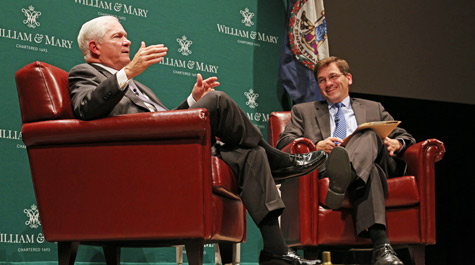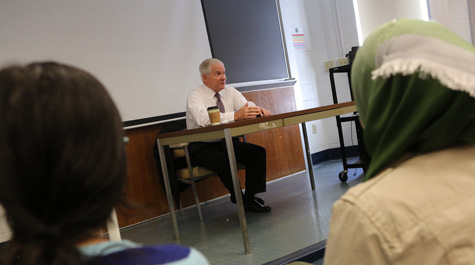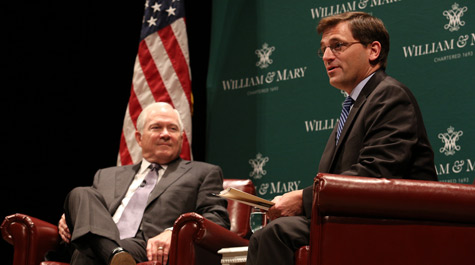Gates shares views on national security at Homecoming symposium
No corner of the earth remained untouched in a far-ranging conversation with W&M Chancellor and former U.S. Defense Secretary Robert Gates ’65, L.H.D. ’98, held Friday afternoon in a packed Phi Beta Kappa Hall.
Gates was interviewed by New York Times White House correspondent Peter Baker in the symposium “Confronting Growing National Security Threats,” one of three leadership symposia held over Homecoming Weekend.
Baker tapped Gates’ lifetime of service to answer questions about Benghazi, Russia, Libya, Syria, Afghanistan, Iraq, China, Ukraine and even Cuba. Gates responded about the use of email, the raid that killed terror leader Osama Bin Laden, whether he is backing anyone for president (he named no one) and even whether he’d himself consider a run for president (“Nice try. And thank you.”).
When Baker, author of the book Kremlin Rising: Vladimir Putin’s Russia and the End of Revolution, asked Gates about Russia, Gates replied with candor. He opined on what the nation’s leaders could have done to prevent Russia’s current aggressive stance and what likely motivates Russian President Vladimir Putin, speaking as a man who had met Putin face-to-face while deputy director of the CIA.
“He and I had a very interesting relationship,” he said. “I think he saw it very much as CIA-KGB. So we would talk to each other with a bluntness, with a directness that sometimes horrified some of our diplomats.”
Gates recalled that he and Putin were once discussing Iranian ballistic missiles when Putin slid him a rough map that seemed to underestimate the missiles’ range.
“[Putin] says, ‘This is what our intelligence services say are the ranges of Iranian missiles,’” Gates said. “I looked at it for a second, pushed it right back at him and said, ‘You need a new intelligence service.’ And he actually kind of laughed.”
Asked the biggest difference between William & Mary during his undergraduate years in the 1960s and now, Gates didn’t equivocate. “The price,” he deadpanned, to applause and cheers. In 1961, he paid just $361 in tuition and fees as an out-of-state freshman entering William & Mary.
“In all seriousness,” he said. “I think the students here are much smarter than when I was here, and the College is much more selective.”
He said that William & Mary students are ambitious and competitive but differentiate themselves from those at Ivies in that “academic competition here at William & Mary is not cut-throat.
“Unlike a lot of places, where they are very competitive and everybody is very smart, competition isn’t a zero-sum game in which for me to succeed, you have to lose.”
Gates also offered advice to current students. “One of the drawbacks of being a Type-A personality is the tendency to plan too much, and to want to have it all mapped out. My advice is not to do that. You just never know. As I look back on my life, I see all of these many branch points, these forks in the road that at the time seemed completely unimportant to me. I look back now and I realize, that decision changed my entire life.”
He remembered when former U.S. President George H.W. Bush called and asked him to serve as the interim dean for the Bush School of Government and Public Service at Texas A&M. An appointment that was supposed to span a few weeks lasted two years, but Gates credits it for preparing him to be president of Texas A&M.
“And I think I would probably not have been selected to be Secretary of Defense had I not been president of a huge university in Texas. So a little decision to do a favor for a friend ended up changing the whole arc of the last dozen years for me.”
The flip side, he said, is that students need to do the hard work so they are prepared for opportunities when they arrive and that they must embrace an element of risk in accepting those challenges and opportunities.
While he was on campus, Gates also shared his insights with students in two courses, “U.S. Military History 1860-1975” and “International Security.”
The national security symposium was the second of three hosted over the weekend. Earlier on Friday, Ted Dintersmith ’74, had spoken at “19th Century Education in a 21st Century Economy.” Dintersmith is producer of the new documentary, Most Likely to Succeed, which examines preparing K-12 students for success in a 21st century economy.
On Saturday morning, William & Mary hosted “Transformational Innovation,” which featured leading William & Mary innovators and entrepreneurs on how they are leading efforts to improve the quality of life for millions of people.



















